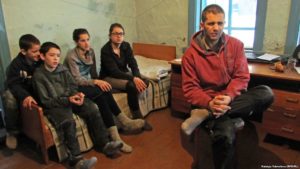Special to WorldTribune.com
Natalya Yakovleva, Radio Free Europe / Radio Liberty
KYSHTOVKY, Russia — In the early 1990s, Eugen Martens and his family left Siberia’s Omsk Oblast hoping to build a better future in Germany.
Now, at the age of 45, he, his wife, and their 10 children have returned to Russia, fleeing what he describes as the sexual permissiveness of German society and the influx of refugees there.

“[Our daughter] Melita didn’t want to attend sex-education classes because she is a Christian, so we were fined for her truancy,” Martens told RFE/RL’s Russian Service. “There, children of the age of 1 are viewed as sexual objects.”
He explained: “In our kindergarten, they gathered the parents together for an information evening where they told us about child sexuality. They make up special games like ‘doctor’ so that they can touch each other. There are special spaces where they can do this without being disturbed. They encourage girls to be attracted to girls and boys to boys because every child has the right to choose their own sexual identity.”
“On the edge of our town, they built a residence for 20 refugees, young men,” he continued. “They can’t work, so what are these young guys to do? How can we let our children out onto the streets?”
Eugen met his wife, Louisa, in Germany, but she is also from Omsk Oblast. They married and began their family there.
Despite having been active participants in German concerned-parents organizations and participating in demonstrations against sex education in several German cities, the Martens family decided late last year to take advantage of a Russian government program aimed at repatriating Russians who left the country or found themselves outside Russia after the collapse of the Soviet Union two and a half decades ago.
Now they are in this remote Siberian village about 540 kilometers north of Novosibirsk, enduring temperatures that routinely hover around minus-30 degrees Celsius. Their four-room log house is heated by a traditional Russian stove and illuminated by dim bare bulbs. They sleep on mattresses placed on the floor; the table and chairs were donated by a local newspaper that was downsizing.
The four-room log house where all 12 members of the Martens family now live.
The four-room log house where all 12 members of the Martens family now live.
It is a region that Russians have been fleeing for generations. Before World War II, there were 250 villages and 58,000 people living there. Now there are just 14,500 people living in 54 settlements.
But the Martenses are together. “Children are like the arrows in a quiver,” Martens said. “What kind of warrior has just a few arrows? Louisa and I are from Baptist families. We don’t go out much. We are simple Christians who live by the Bible.”
The government resettlement program is pretty modest. Established by President Vladimir Putin in 2012, it provides a one-time cash allowance, expedited citizenship procedures, and a reduced personal tax rate. It does not provide housing. Or a job.
Martens said he is hanging on to as much of his 130,000-ruble ($2,200) one-time payment in case the family needs to relocate.
“No one has lived in this house for about 20 years,” Viktor Kuzmin, deputy chairman of the Kyshtovsky region for social affairs, who settled the Martens family in its current quarters. “Of course, it is cold. There are holes everywhere.”
The family relies on a traditional Russian stove to keep the cold Siberian winter at bay.
The family relies on a traditional Russian stove to keep the cold Siberian winter at bay.
Martens plans to build his own house and said he doesn’t need any help. A carpenter by trade, he initially hoped to start a farm in Russia but was put off by the estimated 30 million ruble ($51,000) start-up cost and Siberia’s short growing season.
“In Krasnodar they are able to bring in two harvests a year,” he said. “But they say all the land there is taken.”
Now he’s thinking about going back to making fine furniture like he did in Germany.
“It is good stuff,” local official Kuzmin said approvingly, “but who here needs such beauties? People around here don’t have much money.”
Although locals have welcomed the Martenses and have brought clothing, food, and other necessities to the exotic foreigners, Eugen Martins has not been impressed with Russian officialdom.
“All you have to do is start talking to people and everything becomes clear,” he said. “They complain to me — a foreigner — about how bad it is for them, how arbitrary the officials are. I met one guy from a former Soviet country who came here on the same program as I did. But he said he only got part of the money he was promised — there was no more, they told him. People can’t say anything good about the authorities, but they go out and vote for them because they don’t see any choice. Be that as it may, you have to try to change things.”
Even though it is practically unheard-of in the region, Eugen Martens is insisting on home-schooling for his children.
Even though it is practically unheard-of in the region, Eugen Martens is insisting on home-schooling for his children.
Rostislav Aliyev, the editor of the local paper that donated furniture to the newcomers, has befriended Martens and visits him often.
“I respect people who go against the system,” Aliyev told RFE/RL.
The main thing for Martens, however, is that he insists on home-schooling his children. Although Russian legislation allows the practice, it is virtually unheard-of in this remote region.
